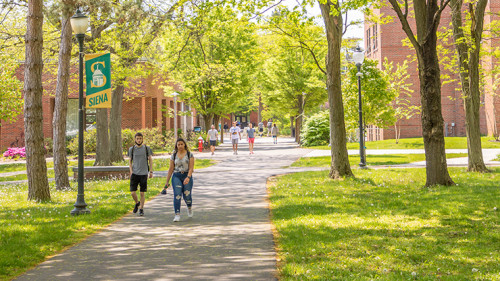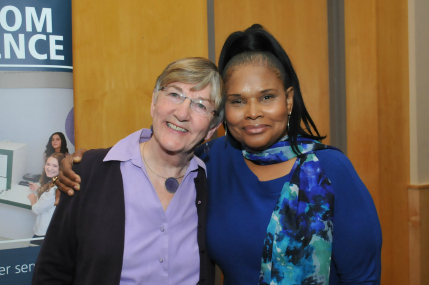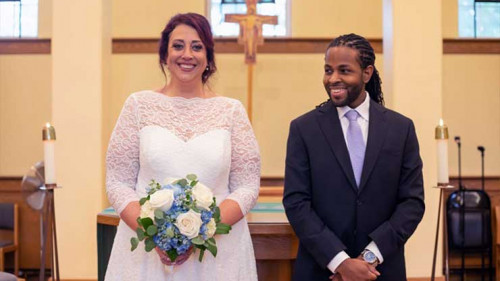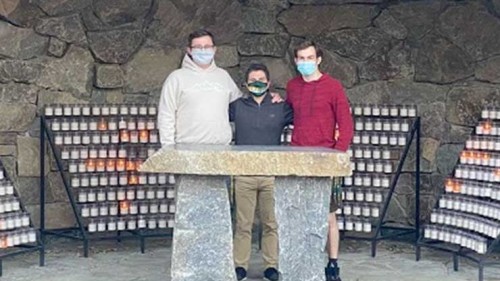

Erin DeGregorio ’16
Siena College and The College of Saint Rose collaborated together in organizing and presenting “Two Women’s Stories: The Long Journey from Drugs and Prostitution to Healing and New Life,” an event to shed light and raise awareness on human trafficking, respectively on Wednesday and Thursday, February 10 and 11.
According to Suzanne O’Connor, associate director of the Career Center and event chair at Siena, the goal of the two-day, public event was to start the conversation about what students and community members can do to help victims and how they can aid the anti-human trafficking movement in their own local communities.
“As a member of the Anti-Violence Task Force, I brought the idea forward at the beginning of fall semester, and was greeted with enthusiastic support to bring these women to Siena College,” said O’Connor. “We decided to tie the event into the week of One Billion Rising to create a very strong message.”
Siena hosted the second night of the event, which began with a community information fair in the Sarazen Student Union. Organizations, including Eyes Wide Open NENY, the Albany County Crime Victim and Sexual Violence Center and Siena’s own Sr. Thea Bowman Center for Women, informed those in attendance of the various, outreach-based resources and services available for trafficked women and children, and how they assist and support those individuals.
Later on in the night, there was hardly an empty seat available to hear the two guest speakers, Edwina Gateley and Brenda Myers-Powell, share their personal and powerful stories and the missions of their current advocacy projects. Gateley, an internationally-known writer, speaker, and leader in women’s advocacy and the fight against human trafficking, and Myers-Powell, a Chicago native who escaped the world of abuse and prostitution as a young adult, provided insights into the underground world of sex trafficking.
Originally born in Lancaster, England, Gateley moved to Chicago as an adult more than 30 years ago, where she earned her master's degree in theology from the Catholic Theological Union. After graduation, she lived for nine months in prayer and solitude in a hermitage in Illinois and spent more than a year on the streets of Chicago, walking with the homeless and women involved in prostitution.
“I’m an alien. I have a card from the United States Immigration Authority, and it says in big, blue letters in the front, ALIEN. I showed them my ID … saying this is who I am,” said Gateley, as she reminisced on how she first interacted and connected with a group of five women on the streets of Chicago. “The women of prostitution took one look at that and started to laugh. It was like they were not threatened by me because they too were aliens, outsiders, immigrants not accepted in society and culture. These women became my sisters and took me into the underworld of prostitution and trafficking.”
Myers-Powell became a product of human trafficking at the age of 14. She experienced physical, mental and sexual abuse during her 25 years as a prostitute. Myers-Powell’s and Gateley’s paths crossed in 1997 after Myers-Powell went to the Genesis House in order to escape prostitution. The Genesis House, founded by Gateley, is a house of hospitality and nurturing for women involved with prostitution. After 18 months at the Genesis House, Myers-Powell left and began to rebuild her life. In 2008, Myers-Powell co-founded The Dreamcatcher Foundation, with Stephanie Daniels-Wilson, to prevent sexual exploitation among at-risk youth and provide them with confidence and stability to get back out into the world. As a survivor of abuse, drugs and prostitution, Myers-Powell provided perspective for women to reach new levels of accomplishments for their future, as evident in her story.
“Edwina gave me a beautiful journal, and I started to write my pain into this journal,” said Myers-Powell as she recollected on her first encounters with Gateley at the Genesis House. “But what we did, that was so powerful for me, was I wrote a letter to Breezy [Myers-Powell’s prostitute identity] … who helped me get through the gun shots, stabbings, abuse, prostitution, jails, nights, trunkings, and make it because Brenda couldn’t have done that. I had to let her go in order to become who I needed to be. We burnt the paper and buried Breezy in the backyard, and it was so beautiful and so healing.”
To see more photos from the event, please visit the Siena College Flickr page.

